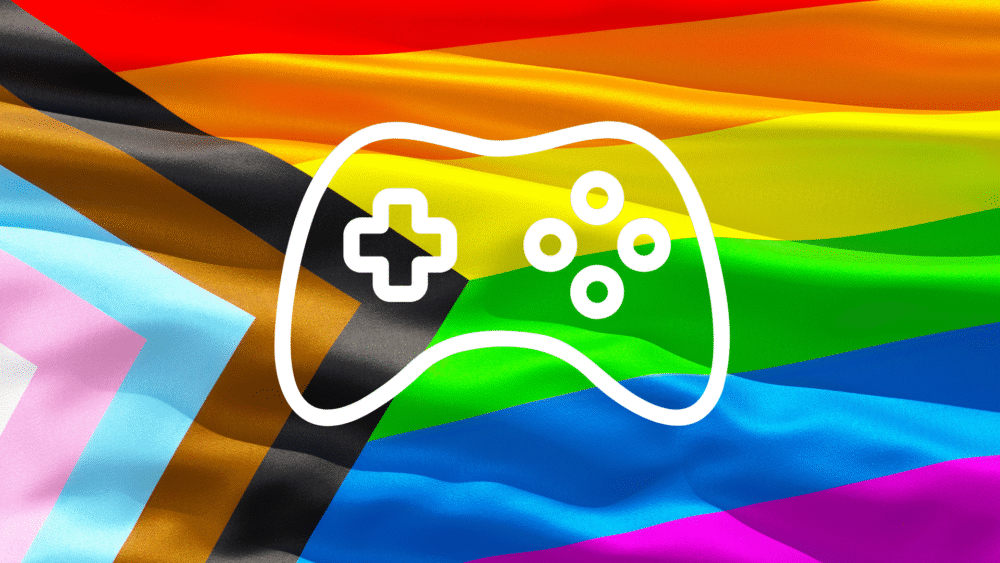
The collapse of corporate Pride and the future of queer game dev
Things felt a bit off this Pride season, a bit more intense in some ways while also quiet in others, which I think is fair to surmise was due to the increasingly hostile Western political landscape, particularly in the United States. With the collapse in corporate Pride support, I look into what the future holds for queer game development.
As of writing, the Trump administration has released 170 executive orders, many of which have targeted supports for oppressed communities. These orders are not legally binding, yet many corporations and institutions have pre-emptively capitulated for fear of potential repercussions, both nationally and internationally.
Of particular relevance here is the Trump administration’s targeting of Diversity, Equity and Inclusion (DEI) initiatives and hiring practices, an intentionally ill-defined concept that has been positioned as a ‘corrupting’ influence in American institutions. Along with the use of ‘woke’, ‘DEI’ has become a weaponised term to justify discrimination in a manner increasingly similar to the U.S. McCarthy era. This is leading to dystopian, Handmaid’s Tale-esqueconsequences for the various communities, such as trans Americans looking to claim asylum in other countries, and is coupled with increasingly fragile international relations between the US and the rest of the world.
All of this has served as the backdrop to this year’s Pride festivities, and sheds some light on how the games industry has been approaching the season compared to previous years. The United States is the largest centre for game development in the Western world and LGBTQ+ communities are disproportionately represented in the industry compared to the general population. This is in an industry where, despite earnings in the hundreds of billions, roughly 10% of the workforce have experienced layoffs so far this year and numerous big-studio projects have been cancelled.
Given the combined administrative suppression of queer voices in public life and the worsening instability of the games industry, LGBTQ+ game developers are experiencing a distinct lack of support on multiple fronts. It’s easy to see then how support for Pride from gaming companies stood to make a positive impact this year in particular, offering queer developers and gamers alike at least some solace.
In years past, for example, live-service games such as Fortnite and Call of Duty have hosted in-game events and have included cosmetics, offering players a way of expressing their identity while still mowing enemies down with a machine gun (see Call of Duty: Modern Warfare’s glittery trans flag weapon skin as an example). Ignoring associations with militarised violence, these inclusions demonstrate a level of intent by both developers and the companies they work for, including these assets and events in the various games to provide players with access to them.
Their inclusion does also beg the question about why companies would do this. It is clear that more than ever, profit is the major motivator for many of gaming’s biggest companies, and so I think it’s fair to assume that being involved in Pride was seen as somewhat advantageous, whether to their staff or the players. This is seen in the data as LGBTQ+ workplace initiatives are shown to not only support LGBTQ+ employees but also support employee retention more generally. Such supports are an increasingly important factor to consider as members of Gen-Z enter the workforce, roughly two thirds saying that they would leave their job if the workplace wasn’t LGBTQ+ inclusive.
Despite this, companies seem to be quietly trying to withdraw visible support for Pride-related events, with many parade organisers in both the U.S. and U.K. saying this year that they found it more difficult to obtain corporate sponsorships. That this comes from the organisers and not from the companies themselves is a demonstration of how companies are quietly withdrawing their (financial) support, the public only aware of what’s happening through a subtle lack of presence.
Such moves are similarly being seen in the gaming industry, demonstrated by the leaked internal memo from Jagex CEO Jon Bellamy. Reported on by Hilary Mitchell for PinkNews, Bellamy informed employees that they would not be releasing any Pride-related content or running any related events in their games RuneScape and Old School RuneScape (OSRS) this year. In an open letter to management, developers indicated that they were willing to develop assets in their own time and showed that previous Pride events had not affected company profits. Bellamy and Jagex management doubled down though, justifying their decision by saying that developers should prioritise player experiences rather than “us[ing] the game as an outlet for our own views.”
This argument frames support for LGBTQ+ communities as an ideological position that treats exclusion as merely a difference of opinion. Developers were willing to work on Pride assets for the company and even provided an analysis of profits as support, yet Bellamy’s decision was nevertheless enforced. Exclusion through a lack of inclusion was the course of action and was justified by weaponising the supportive language used when describing LGBTQ+ gaming communities.
As Mitchell reports, since Jagex is owned by the Jersey-based private equity firm CVC Capital Partners which has a number of U.S.-based companies in its portfolio, various employees believed that Bellamy’s decision over Pride was ultimately driven by a desire to appease the Trump administration and U.S. conservative thinking.
Regardless of whether Bellamy knowingly did this, the consequences of his decisions are the same. Bellamy and Jagex framed Pride and support for LGBTQ+ communities as ideological, demonstrating an uncomfortable parallel with language used in Trump’s executive orders. Again, while not legally binding, this shows the destructive effects of President Trump’s various executive orders as a company capitulates to his demands for fear of repercussion.
What makes this even worse is that we know all of this not because Bellamy and Jagex released public statements, but because whistle-blowers leaked documents to the press. If this hadn’t happened, we would only be going off of gut feelings and hearsay. As a precaution then, I think we should be assuming that other companies have had similar discussions and have made similar decisions. We just haven’t heard about them (yet).
Given all this, it’s worth (re)considering how much corporate involvement there should be in Pride celebrations. Corporations, particularly large corporations, are obviously employers of those in LGBTQ+ communities, and having their employees march in the parade lets them demonstrate how supportive they are of them. They also tend to have large pockets, and can be a good source of funding. This I view as a kind reading of their involvement.
On the more cynical side, Bellamy and Jagex’s actions highlight how corporate involvement is always going to be conditional; they will be there so long as there is some advantage to be gained. As stated, employees are generally more likely to stay at a specific company if it is viewed as LGBTQ+ -friendly, reducing their recruitment and training costs by strengthening the company’s image. If this is no longer seen to be the case, or if they fear the backlash will be too severe, then they no longer have any reason to participate.
While disappointing for some, I don’t think we should be surprised by this and should question what Pride really is if it’s dependent on corporate involvement.
All that being said, it is difficult to realise that those who created the games you’ve gotten so much joy out of are disinterested, for a lack of a better word, in standing with you during a time of increased bigotry against the communities you’re a part of. It’s important to remember though that these games are supported by your time and money, and you need to consider whether they are still worth the investment.
In this age of increasing corporate spinelessness, remember that there are queer developers out there who could use your support and community spaces you can get involved in, regardless of whether you are a player or a developer. The itch.io site and Steam store are full of games from independent studios and developers who are crying out for support, various organisations such as the International Game Developers Association (IGDA) run an LGBTQ+-specific developer group, and there are plenty of queer game jams out there that are suitable for developers of all levels.
As much as you can, support the work of queer game developers, get involved in game development yourself or become a part of a queer gaming community.
While it’s upsetting to see these companies about-face at the slightest whiff of a repercussion, it’s important to remember that we never really needed them in the first place.






Loved this article, thank you for sharing and including important researched links for further reading. The last sentence rings true: Pride was never a place for corporations, capitalism, or any conditional terms with a favorable advantage. It is a celebration of who we are as people, uncompromising in the face of any oppressor. We are not a selling point to maximize profits, we are sponsored exclusively by our love for one another. We never really needed them in the first place.